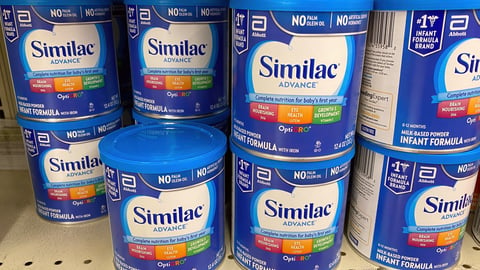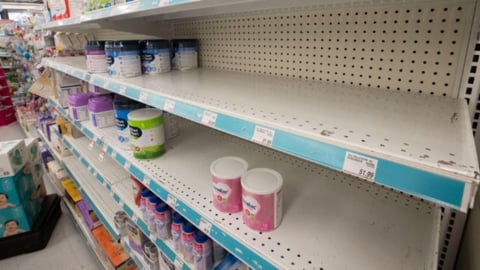What's happening with Canada's baby formula shortage?
Canada's baby formula shortage has stabilized and the situation is improving, say officials including Health Canada, pediatricians and industry representatives.
But supply problems continue, leaving many parents and caregivers with questions – including what they should do.
It's been more than a year since a product recall forced formula manufacturing giant Abbott Nutrition to close its Michigan factory in February 2022.
Although it reopened in July 2022, "it has not yet returned to its normal production capacity,'' says Health Canada's website, which also notes the plant manufactured several products "that accounted for a significant portion'' the Canadian market.
"This has increased the demand for infant formulas produced by other manufacturers,'' Health Canada says.
Where are we at with infant formula supply?
"We are still seeing issues in the supply chain with regards to baby formula,'' Michelle Wasylyshen, a spokeswoman for the Retail Council of Canada, said by email.
She said liquid, ready-to-feed formula is most consistently available, but powdered formula remains limited.
Noting that powdered formula is often less expensive, Health Canada says more of it is being imported and sent to stores across the country.
"This can provide additional options and may help alleviate some of the pressures experienced by families in Canada,'' Health Canada says.
Canada doesn't have any domestic infant formula manufacturers, so it relies completely on imports – largely from the United States.
[Read more: “Could Canada's supply of baby formula run dry?”]
What about specialty hypoallergenic formulas?
Specialty formulas were an especially concerning part of the shortage last year, said Dr. Janice Heard, a Calgary pediatrician and member of the Canadian Paediatric Society's public education advisory committee.
The special formulas hydrolyze – or break down – cow's milk proteins.
They're needed by infants allergic to cow's milk proteins and premature babies who haven't developed all the enzymes needed to digest them.
There are limited options for specialty formulas, so the shortage has been "very stressful for parents who already were dealing with medically compromised kids,'' Heard said.
The supply of specialty formula in Canada "has improved,'' said Wasylyshen.
Health Canada agreed, adding that the shortage of hypoallergenic formulas has "largely subsided and is replaced by a limited, but stable supply.''
What is the federal government doing?
Health Canada and the Canadian Food Inspection Agency have been allowing more infant formulas that don't have the required bilingual labelling to be imported into Canada under a special "interim policy.'' That policy has been extended until the end of the year.
Health Minister Jean-Yves Duclos and Health Canada have been talking with "multiple manufacturers,'' including major U.S. manufacturer Abbott, British manufacturer Reckitt and Irish-U.S. manufacturer Perrigo, "to address the short-term issue'' and talk about longer-term solutions, the minister's spokesman said in an email to The Canadian Press.
But industry representatives are calling on the federal government to do more.
"At the root of our challenges has been a very unique and very restrictive and very prescriptive regulatory system around infant formula here in Canada,'' said Michi Furuya Chang, vice-president of public policy and regulatory affairs at Food, Health and Consumer Products of Canada.
She said Canadians don't have access to many "safe and effective products'' available in other countries.
In general, Canada also takes much longer than the United States to approve the same infant formula, said Chang.
The association wants Health Canada to shorten the time it takes to review and approve infant formula from other countries whose approval processes are "like-minded'' to Canada's.



